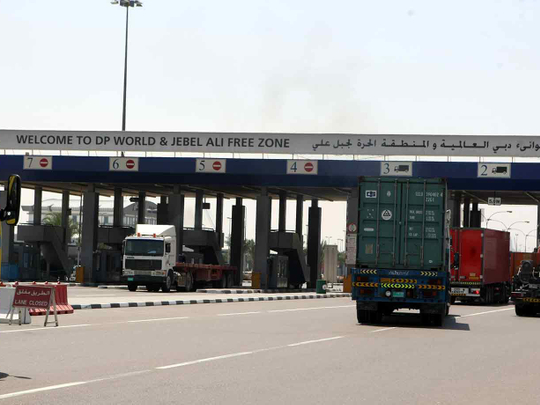
The UAE’s Cabinet on Wednesday finalised designated free zones for application the Federal tax-law No (8) relating to Value Added Tax [VAT].
An unofficial translation of the Cabinet decision lists 20 free zones across the country as designated free zones under special treatment under VAT law.
The Cabinet decision is effective from January 1, 2018.
According to the UAE VAT law, a designated zone is an area specified by the Cabinet decision.
A designated zone that meets the conditions specified in the Executive Regulation of VAT law shall be treated as being outside the State.
Article (51) of the VAT law specifies that transfer of goods between designated zones are tax free.
According to the Executive regulations of the tax law, a designated Zone is a specific fenced geographic area and has security measures and Customs controls in place to monitor entry and exit of individuals and movement of goods to and from the area.
Additionally, a designated zone shall have internal procedures regarding the method of keeping, storing and processing of goods and the operator of the designated zone complies with the procedures set by the Federal Tax Authority (FTA).
The UAE Cabinet has the authority to amend the list of designated zones.
No VAT
According to tax experts, acquisition of goods within a designated zone for incorporation into another unconsumed good located within the same designated zone will not be subject to UAE VAT.
The 20 designated zones selected from 45 free zones in the country qualifies for transfer of goods between them not be subject to tax.
“Goods may also be transferred between Designated Zones without being subject to tax if the goods are not used or altered during the transfer process, and the transfer is undertaken in accordance with the rules for customs suspension per GCC Common Customs Law. The FTA may require a guarantee equivalent to the tax liability of the goods to be transferred in case the conditions for the transfer of goods between Designated Zones are not met,” said Afridi & Angell, in a recent note.
The movement or supply of goods into a designated zone from within the UAE will not be considered an export of such goods from the UAE, and as such will not receive zero-rating which an export outside of the GCC would receive.
Read our piece on how VAT is applied on free zone operations.
A large number of entities operating in these zones provide services as their primary taxable supplies.
The Executive Regulation specifies that the place of supply of services is considered to be within the UAE if the place of supply is within the designated zone and, in effect, aligns the VAT treatment of service entities operating within designated zones to similar onshore entities within the UAE.
Here's our guide to all the free zones in the country.
Here's the complete list of Designated Zones as per the Annex to the Cabinet Decision No (59) of 2017 No. Designated Zones.
Abu Dhabi
1. Free Trade Zone of Khalifa Port
2. Abu Dhabi Airport Free Zone
3. Khalifa Industrial Zone
Dubai
4. Jebel Ali Free Zone (North-South)
5. Dubai Cars and Automotive Zone (DUCAMZ)
6. Dubai Textile City
7. Free Zone Area in Al Quoz
8. Free Zone Area in Al Qusais
9. Dubai Aviation City
10. Dubai Airport Free Zone
Sharjah
11. Hamriyah Free Zone
12. Sharjah Airport International Free Zone
Ajman
13. Ajman Free Zone
No. Designated Zones (Umm Al Quwain)
14. Umm Al Quwain Free Trade Zone in Ahmed Bin Rashid Port
15. Umm Al Quwain Free Trade Zone on Shaikh Mohammad Bin Zayed Road
Ras Al Khaimah
16. RAK Free Trade Zone
17. RAK Maritime City Free Zone
18. RAK Airport Free Zone
Fujairah
19. Fujairah Free Zone
20. FOIZ (Fujairah Oil Industry Zone)












